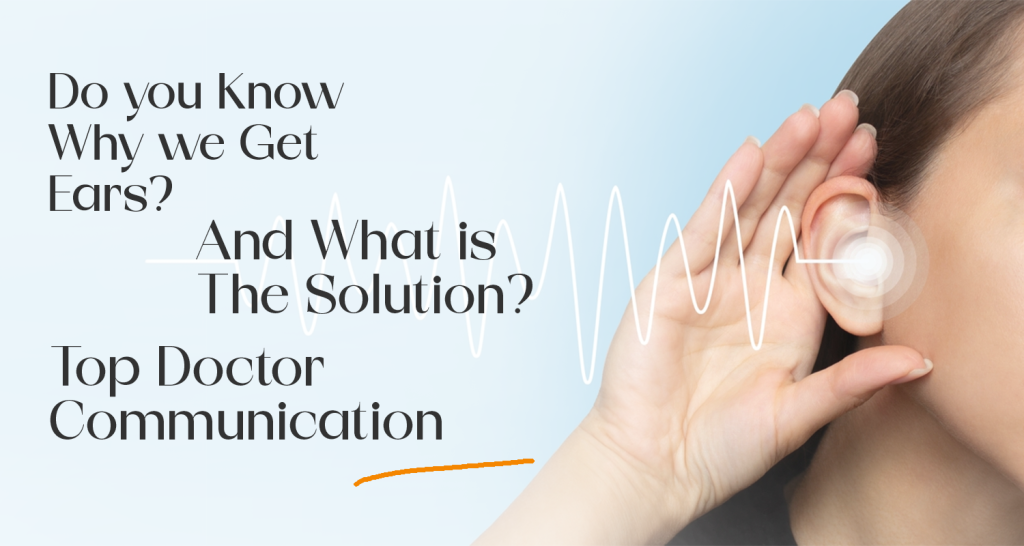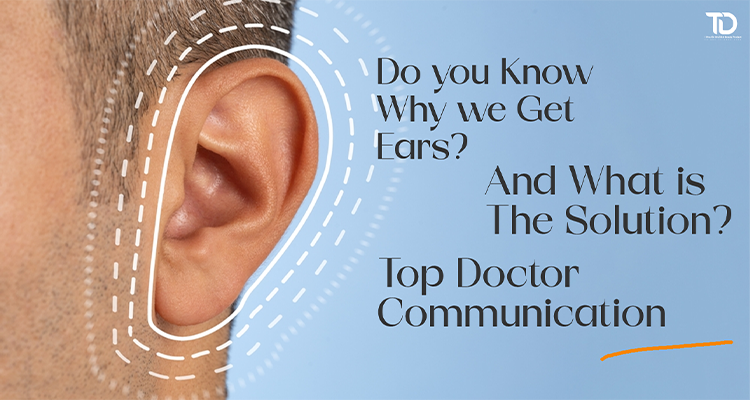Doctor at the Top of His Ears, Headaches, Migraine, Dizziness, Nausea.
Dr. [Jekline Kelly ] is an experienced Ear Nose Throat (ENT) physician and has special interest in neurological conditions including; headaches, migraines, dizziness and nausea. Foremost, Dr. Vincent Batista boasts of years of working experience and is friendly towards patients. Dr. [Your Name] has become one of the most requested physicians in the country simply because he or she doesn’t stop until they help patients change their lives by finding ways to tackle difficult symptoms.
Special Focus Area- Ear Disorders
Dr. [ Michal Rose ] focuses on assessment and treatment of hearing disorders, tinnitus, otitis media, and other balance disorders including Meniere’s disease and vestibular neuritis. These conditions complex themselves often have dramatic effects on one’s quality of life, and Dr. [Your Name] uses sophisticated diagnostic equipment and research-based treatments to bring back the function of any part of the auditory or vestibular system.
Mis 1001 Migrastik Büyük Baş Ağrısı ve Beyin Fırtınası Tedavi hizmetleri
Migraines and other kinds of headaches are extremely dangerous since they may significantly hinder a person’s ability to work and perform everyday tasks. Dr. [Jhone Smith] knows the background of these conditions, however they have strong relation with ear as well as balance problems. They offer personized treatment protocols which might incorporate diet changes, evidence based early intercessions, pharmacologic and nonpharmacologic therapies, and even Botox for migraines, or neuromodulation methods.
Remedies of Dizziness and Nausea
Nausea and dizziness can have multiple origins, such as vertigo problems that originated from the inner ear parts, but can also originate from neurological disorders. Dr. [Your Name] uses various methods and hi-tech equipment including videonystagmography (VNG) and vestibular evoked myogenic potentials (VEMP) in order to identify the problem. Management strategies may be prescribed to manage symptoms and address balance issues and they include; Vestibular reconditioning, changes in diet and medicine.
Chronic Disease Management
Dr. [Michal Smiths] knows that each patient is an individual and always tries to understand what the problem is that they describe. With knowledge of the recent advances in medicine and servicing the nation, Dr. [Your Name] guarantees safe treatment to the patients and provide only the best treatments that is customized according to the patient’s condition.
Recognition and Awards
Dr. Those who have been awarded honor and recognition consist of physicians such as [Your Name], who has been voted and accredited as one of the premier physicians in the specialty both by colleagues and professional bodies basically to warrant better patient care and treatment. Patients trust Dr. [Your Name] to offer specialized service which brings about positive change in the extent of the symptoms affecting their lives.
If you are experiencing ear disorders, headaches or migraines, dizziness or nausea, come to Dr. [Your Name] to support you in getting your health and your life back.
Long-Term Relief From Ringing and Buzzing Ears While
Tinnitus is the medical term for the noise or ringing in the ear and is one of the hardest conditions to manage. They are identified by ringing, buzzing, hissing, clicking or any other sound that the sufferer can hear, but has no physical cause. Tinnitus is a common condition that occurs in millions of individuals and ranges from a mildly bothersome to a catastrophic condition. Lucky for us, there are remedies and approaches that can help with such conditions and enable future and present suffering to have long-term relief and enhanced quality of life.
A Step Towards Knowing the Causes
According to the researchers, tinnitus is not actually a disease by itself, but is a sign of a different disease. Common causes include:
Hearing Loss: Tinnitus can therefore be as a result of age related hearing impairment or hearing impairment that is caused by noise exposure. Exposure to Loud Noise: Over time loud sounds wear out the hair structure in the inner department of the ear.
Earwax Buildup: But excessive earwax may cause impaction within the canal and render sounds coming from inside the ear louder. Medications: Some medicines including aspirin and antibiotics may cause or worsen tinnitus. Medical Conditions: Others include: Meniere’s disease, hypertension or temporomandibular joint (TMJ) disorders.
In order for one to look for long-term solutions to the question it is important to try and understand the root cause of the problem.
Strategies that ensure long term relief for a patient
- Hearing Aids
If the tinnitus is linked to hearing loss, hearing aids are normally a great aid. These devices increase the volume of outside noises so the sufferer becomes less aware of the sound of tinnitus. Tinnitus is also masked in many of the modern hearing aids as a special option, built into the hearing device. - Sound Therapy
Through this, sound therapy helps to eliminate the tinnitus sound from within by using other external sounds. White noise machines, or calming nature sounds, or any specific tinnitus app that will help you to get some relief. It can hope to be solved by hardening of the brain to the sounds which is known as habituation. - Cognitive Behavioral
CBT primarily targets the erroneous way of thinking about tinnitus symptoms and the emotions that are believed to be closely related to tinnitus. Because Stress and anxiety are two of the most common psychological factors linked with tinnitus, CBT can greatly minimize perceived tinnitus loudness and associated distress. - Tinnitus Retraining Therapy (TRT)
TRT is a combination of stigma counseling and tonal sound that allows the brain to filter tinnitus as meaningless noise. This is a time consuming process but works very well for most people, especially those patients with chronic illnesses. - Lifestyle Modifications
Stress Management: Stress can worsen tinnitus. Some ways of Softening Its Effects Include Simple things like doing the yoga, meditation, or deep breathing exercises. Healthy Diet: Certain recommendations such as taking low caffeine, less alcohol, and low sodium diets may improve a person’s symptoms.
Regular Exercise**: Regular exercise causes a flow of blood hence solves the circulation problem, which in turn may reduce tinnitus symptoms. - Medical Interventions
Sometimes if the root of the problem is understood it can be easily cured and there will be no further issues. Some of the common treatments that may be rendered in the procedure may include cleaning the ears, treating high blood pressure or TMJ conditions.

Emerging Treatments
Current medical science holds promise of change. TMS is an example of neuromodulation that can be pivotal in modifying regarding tinnitus related brain activity.
When to Seek Help
Tinnitus is largely self-limiting and if it is constant, getting louder or is aggressively interfering with the quality of life, help from an audiologist or ENT specialist is advisable. That is why early intervention can help increase the likelihood of successful management.
ABOUT THE BOOK By learning about these approaches and collaborating with medical personnel, numerous people can live freely from the tinnitus intrusion and restore their valuable time.
There Is Always a Reason for Headaches
Headaches are a general problem that affects everyone irrespective of the age they are. In most cases people tend to disregard them as mere minor disturbances, but headaches are not hatched full grown they happen for a reason. Understanding the above reasons should be of great help towards managing and or eradicating them.
A headache is often categorized as primary or secondary. Tension headaches are separated into migraine, tension, and cluster headache is also known as primary headaches and are a result of a medical condition. Secondary headaches on the other hand occur as a consequence of another disease, condition, injury or another cause.
Another type of headache is tension or stress headache. They are caused by contraction of muscles in the head or the neck hence the name tension headaches, may be occasioned by emotional stress, poor posture or too much working. Such headaches are generally described as mild to moderate, and are steady, pressure-like in character.
Another common cause of decreased Cognitive function or Cogfog is dehydration. Dehydration can cause headaches and the human brain is very sensitive to changes in fluid level. This is so because, when the body gets dehydrated, blood vessels of the brain constrict and the result is that oxygen flow is restricted too and this Prococessed causes pain.
Sleep patterns also contribute to this ailment in a big way. It is also provided that if one sleeps too much or on the other extreme sleep too little one is likely to develop headaches. Flexibility of time is unproductive over a long period, and this means variation in sleeping patterns could cause discomfort as the body will not function as required due to disruption of the circadian rhythm.
Another reason the headaches happen are dietary triggers. There are also foods and beverages that trigger headaches; such as caffeine, alcohol, aged cheese, processed meats such as bacon containing nitrate salts. It also results to headaches since it means that the body’s blood sugar levels has immensely reduced because of not eating.
Some people who normally suffer from migraines will be sensitive to light, sound, or smell, for example. Frayling manifests that these sensory stimulants send signals to the brain leading to the throbbing pain that is typical of migraines.
Further, changes in hormones especially for females have a way of affecting fertility. Some of the several triggers of headaches are hormonal – related to changes in the menstrual cycle, pregnancy, or menopause. This is usually associated with estrogen impact on the vessels of the brain.
Now and then, headaches are symptoms of some other diseases; they may include sinusitis, hypertension or even brain injury. These secondary headaches usually are associated with the underlying medical condition, and the patient might need a prescription.
Therefore, the causes of headaches are many and varied from matters that are mostly mirror image to diseases. Individual triggers and causes must be determined to help manage them properly. Another more easily achievable way of minimizing the frequency and severity of headaches is keeping hydrated, avoiding stressful situations and getting enough sleep, as well as avoiding foods that contribute to headaches. However, if headaches are chronic or escalate, it’s wise to see your doctor, particularly when they’re accompanied by other symptoms suggesting a severe disease.
Migraines Do Not Just Happen For No Reason?
Migraine are a neurological disorder, which includes severe, pulsating headache that is usually accompanied by other incapacitating symptoms, it is estimated to be affecting millions of people globally. But what are they more than a mere headache they may considerably lower a person’s QoL as they may include such symptoms like nausea, increased sensitivity to any sound and light, and visual problems? There is no specific known cause of migraines; however, they can happen due to various factors: genetic, environmental, and lifestyle something in between.
Family history of throbbing headaches is a direct genetic cause of migraines. It has been noted that migraine is often hereditary, or has hereditary tendencies, which means that it comes from one’s family genes. If one of the parents suffer migraines than their child has 50-50 chance to get them as well; if both parents suffer they have 75% chance to get them. Experts have located several genes and mutations associated with migraines and how neurons and nerves control pain signals.
Another important cause of migraines is environmental conditions. Stress triggers migraines as do changes in weather such as low barometric pressure, and heat as well as high humidity. Some of such changes may cause change in blood flow or /and affect the nerve pathways, thus provoking the disease. Further, even bulb light or fluorescent light, smells or smells and sound that flickers can also bring about migraine.
Certain behaviours and habits in peoples everyday lives can cause migraines to occur. Stress is one more commonly cited cause since stress evokes hormones that may well induce inflammation or alter the blood vessels’ functioning. Likewise, lack of sleep or even sleeping for too long can keep the brain out of balance and therefore a case of migraine. Another category is related to nutrition: eating specific foods and drink, such as caffeine, alcohol, processed meat products, and aged cheese causes the migraine in some people. One more pull between lifestyles that can constitute a migraine is dehydration.
Cyclic changes in female hormones are known to be a possible triggering factor for migraines. Some of the most common migraines occur in women of childbearing age or during menstruation, pregnancy or menopause; because hormonal changes are believed to affect the occurrence and severe migraines.
Last but not the least, migraines are caused by neurological changes in the brain of the human body. Migraine has been known to be a condition involving electrical signals produced by the nervous system, blood vessels and some brain chemicals. For instance, suppose there has occurred a change in serotonin levels – its decrease; then blood vessel dilation occurs, and this causes pain as well as the occurrence of migraine.
There are various potential reasons why migraines start and understanding these would be of very helpful in management. Daily triggers must be recognized, healthy life patterns be followed, and doctors consulted in order to minimize them and enhance the quality of life for sufferers.

Dizziness: Etiologies, Signs, and Treatment
It is an outrage that many people experience dizziness in its diverse forms which may be in forms of light-headedness, uneasy balance, or a spinning sensation referred to as vertigo. That is, because it is classified as a symptom that relates to the patient’s observations, its symptoms and manifestations may differ greatly from one person to another. Dizziness is neither a disease nor a syndrome but a symptom that may have numerous causes, which may be minor and self-limiting, or more severe and potentially serious.
Common cause of dizziness
- **Inner Ear Problems:
The inner ear is highly important for one’s balance, and performing this function. Conditions such as **benign paroxysmal positional vertigo (BPPV) **, **vestibular neuritis or Meniere’s disease may lead to of dizziness. For instance, BPPV happen when tiny particles within the inner ear called crystals shift position and causes one to feel dizzy for a few moments, depending on the head position. - **Circulatory Issues:
The instances when the blood supply is low, include dizziness. It might occur because of *hypotension*, loss of body fluids, or other heart-related diseases such as atrial fibrillation or congestive heart failure. Lowering of blood pressure that results in dizziness is also experienced in orthostatic hypotension, that is, a fall in blood pressure when a person rises from a sitting or lying position. - **Neurological Conditions:
Migraine, *Parkinson’s disease*, or even a *stroke* can be behind dizziness. In these cases dizziness can be compounded with features such as headache, weakness drop attacks or difficulty in speaking. - **Medications and substances:
Some drugs, such as those for lowering blood pressure or treating anxiety, sleeping problems or depression, may have dizziness noted in the side effects. The problem is that alcohol or drugs affect balance also which may result in dizziness. - **Anxiety and Stress:
There are other causes for dizziness such as anxiety disorders or panic attacks, which should be always considered. This type of vertigo is also known to present with hyperventilation or feelings of dissociation. - **Other Causes:
Few diseases like anemia, low blood sugar levels, or even an infection can lead to loom sickness. Sometimes it may be hard to find out which particular variation led to a given graph since one or more variations can mask the other.
Some of the Signs Linked to Dizziness
Vertigo can include other symptoms apart from dizziness depending on the cause of Vertigo. These include:
Nausea or vomiting.
- Tinnitus, or the perception of sound in the ears.
Walking impaired or unsteadiness or difficulty in doing so.
Vision, blurred vision or double vision.
Paralysis or tingling which may be a sign of a neurological problem.
Managing Dizziness
Management depends on the underlying cause:
BPPV: Some movements such as the Epley maneuver can help to move the crystals in the inner ear which should relieve the symptoms.
Dehydration or Low Blood Pressure: Thus, other measures that could be useful include taking liberal amounts of fluids, increasing the intake of salt or using compression stockings. Migraine: Migraine related dizziness can be managed through medical management and if the dizziness is related to certain things that should be avoided, then avoiding those triggers is recommended. Stress or anxiety: Mindfulness, breathing exercises, or therapy can be the solution for that.
If focusing toward the treatment of dizziness, one would need professional healthcare advice, if dizziness is chronic, severe and simulating other hazardous symptoms like chest pain, difficulty in speaking and a sudden vision problem.
Prevention
In the prevention strategy some of things that should not be done are taking alcohol,. They can also pinpoint early possible causes which can be discovered through routine check-ups.
The sensation referred to as dizziness is mostly harmless but should not be dismissed, especially where it interferes with functional ability. Knowledge of the cause is crucial so that a patient can be treated properly and gain overall health.
What Causes Nausea?
Nausea is an unpleasant feeling in the stomach or esophagus which is a prelude to vomiting. It is not a disease by its own but it is produced as a result of other diseases. Vomiting may be brought on by a number of physical, psychological, or environmental stimuli. To discover the right solution, it is crucial for the causes to be recognized. However, this disease can be caused by several factors, as follows: Below are grouped according to major categories the usual causes of nausea.

Gastrointestinal Causes
Among the common triggers for nausea, IN is one of the most common primary symptoms associated with the GI tract. Most people have nausea at some point in their lives due to various diseases of the digestive system, for example, GERD, gastritis, or food poisoning. Further, there are obstructions within the intestines or conditions that hinder proper digestion such as peptic ulcers, which get worst and triggers queasiness and discomfort.
Nausea can also be blamed on food intolerances and allergies. The eating disorder also shows symptoms when the body senses certain foods as toxic and can cause vomiting, nausea and abdominal ache. Taking a lot of food or taking food that has gone bad can also flood the digestion system and cause nausea.
Motion Sickness and Vestibular Disorders
In essence, motion sickness is a result of a difference in what the eyes perceive and what the inner ear feels about motion. For instance, while reading a book, if you are in a moving vehicle you get a signal to the brain leading to nausea. Other examples include vestibular disorders, which are diseases of inner ear and balance, like vertigo, or Ménière’s disease, which is accompanied by nause
a and dizziness.
Infections and Illnesses
One common accompanying symptom is nausea that can be found in infections such as viral gastroenteritis also known as the stomach flu and much more severe cases like sepsis. NAUSEA may be due to chemicals produced by the body’s immune system that affect the stomach or brain when the body is fighting an infection. Fever, dehydration and fatigue make the sensation worse.Hypoesthesia, the reduced feeling of light touch may be present.
Pregnancy
Another disease producing nausea is, by far, morning sickness, which is a common term for nausea experienced by pregnant women. Increased levels of progesterone – related hormone hyper secretion of human chorionic gonadotropin amounts to this situation. Indeed, nausea may begin early in pregnancy, most often in the first weeks, but may also be observed throughout pregnancy in some women.
Treatments
Nausea is a side effect that many medication have a facility for. Acetaminophen, Nonsteroidal anti-inflammatory drugs, and antibiotics, and cancer-fighting drugs. For example, nausea can be caused by irritation of the stomach lining by chemotherapy or through the chemoreceptor trigger zone in the brain. Surgery may also cause temporary nausea due to the anesthesia that may be administered while the surgery was in progress.
Psychological Causes
Nausea may be caused by these emotions such as stress, anxiety and fear among others. The two are the brain-gut axis, which presents the relationship through which one can establish how the emotions affect the digestive system. Social anxiety nausea may rear its head during a encounter with people, and a speech or tests are common stressful circumstances.
Neurological Disorders
Nausea is also experienced when there is an ailment in the brain; examples are migraine, trauma to the head or a brain tumor. In these cases nausea is attributed to alteration in the central nervous system. The throbbing pain of migraines, for example, may trigger the vomiting part of the brain.
Toxins and Poisoning
presence of toxins – alcohol, drugs, or chemicals yields an adverse impact on the consentient stomach or hinders basic body functions which may lead to nausea. The same goes for foodborne toxins or spoiled foods .
Conclusion
Nausea is a very common complaint and it has many potential underlying in origin from gastrointestinal pathology to infections, neurological and even psychogenic factors. The proper identification of a root cause of the problem is therefore critical. Persistent nausea or when experienced with other serious symptoms, a person should not hesitate to visit the doctor.

Why You? What Is The Reason? Losing Hearing Capability!
Life is always about clarity, you know. It directs our choices and actions, determines how we speak and for how much we comprehend. However, when there is uncertainty that clarity of institutionalization is being addressed, then what happens is: Impaired hearing Often, one of our most crucial senses, hearing, may not act optimally as it supposed to do. The main problem is that if one cannot hear properly, this has a knock-on effect on virtually every aspect of their life: social, professional and even physiological. So here further specifics to why this problem should not be ignored and why clarity in hearing should always be of high importance.
‘.’ Hearing and Communication
Auditory communications are the foundation for relationships in human interactions. This makes it possible to explain concepts and ideas, to talk and express moods and feelings, and is the best way for describing experiences.
When you go through life and don’t hear well can be compared to reading a book but with missing pages, you lose part of the stories.
People get confused, become annoyed or have conflicts over what was well said and intended. Perhaps you are in a meeting and important directions are being provided and instead of hearing clearly a voices in the background. Or not being able to hear a beloved’s voice and the laughter of dear ones due to the loud talking surrounding them. These moments matter ,and hearing loss – steals them away.JPG Where are you going now you have hearing loss?
What Causes Hearing Loss?
Hearing clarity can be reduced by a number of factors that include the following; Aging is one of the biggest offenders in which ordinary deterioration of the auditory structures and pathways makes it hard to discern pitch. However, there are other factors, which, can contribute to hearing loss, including exposure to loud noise; untreated ear infection; certain medication; and even heredity. They can be as varied as the people that experience them, but the consequence is often the same – struggling to interact with the society.
The Effects Of Failure In Solving This Issue
Various adverse effects arise when one decides to neglect hearing problems. Silence is another common experience with persons avoiding discussions and other engagements they consider they are disadvantaged. Such isolation can in turn lead to anxiety, depression and cognitive impairment. In the workplace context, it is as equally disadvantageous because it may slow down performance, lead to misconceptions and possibly affect promotions and other organizational upward mobility opportunities. But it’s not a theoretical or imagined cost – it is very real and, for some, calculable.
Seeking Solutions
Fortunately there is help available. Today’s hearing aids are better than hearing aids ever were; they are arguably some of the best hearing aids because they provide higher quality sound and enhanced comfort. They are adjustable to detect some frequencies, minimize interference signals, and perform under different conditions. Prevention is the key; there’s always time for a hearing test and if there’s an underlying problem, then it will be detected before it worsens. Some of the practical changes include minimizing one’s contact with loud sounds and ensuring one’s ears are clean as well.
Why this Should Matter to You?
The answer is simple: because the world is a better place when everything can be heard. In the simplest form it is the sound of the first words a child utters, the beat in a song, or even nonverbal signals in a conversation. This is iMpossible since you are able to regain the clarity that is needed to experience life by seeking help on issues that affect hearing as early as possible.
So, why you? The reason is that you should have an opportunity to live an unrestricted life, speak without fear, and interact with other people. Never let those faint cries of today turn into the silence of the following day. Manage yourself and do the right thing because every sound counts and so does you.





